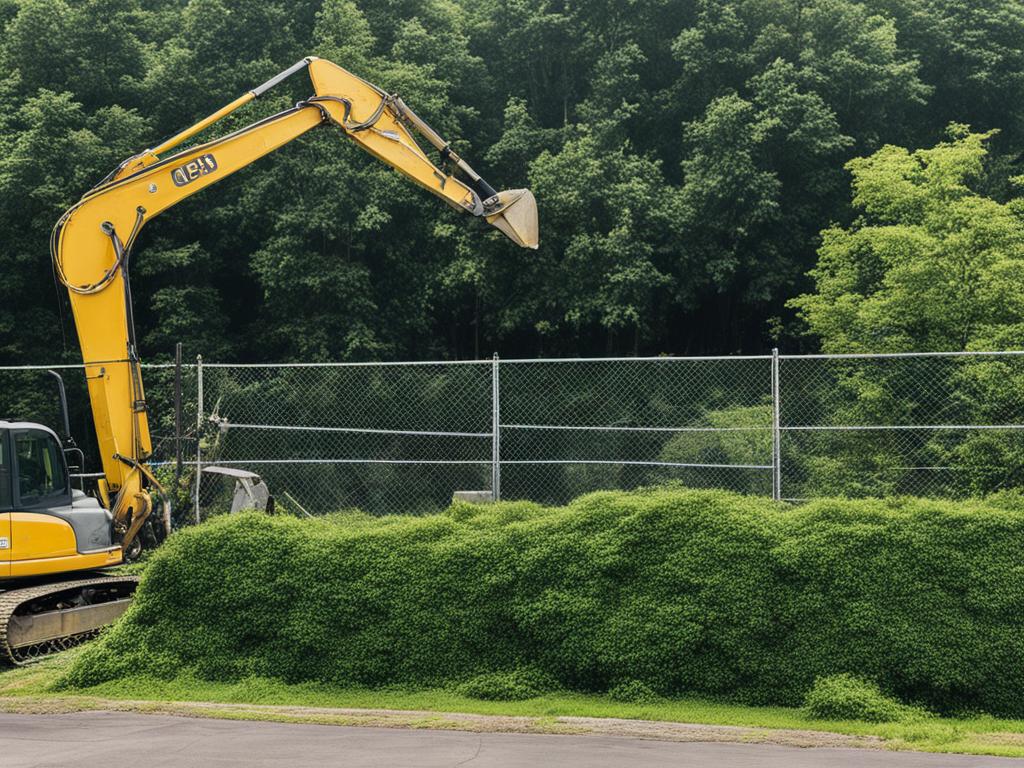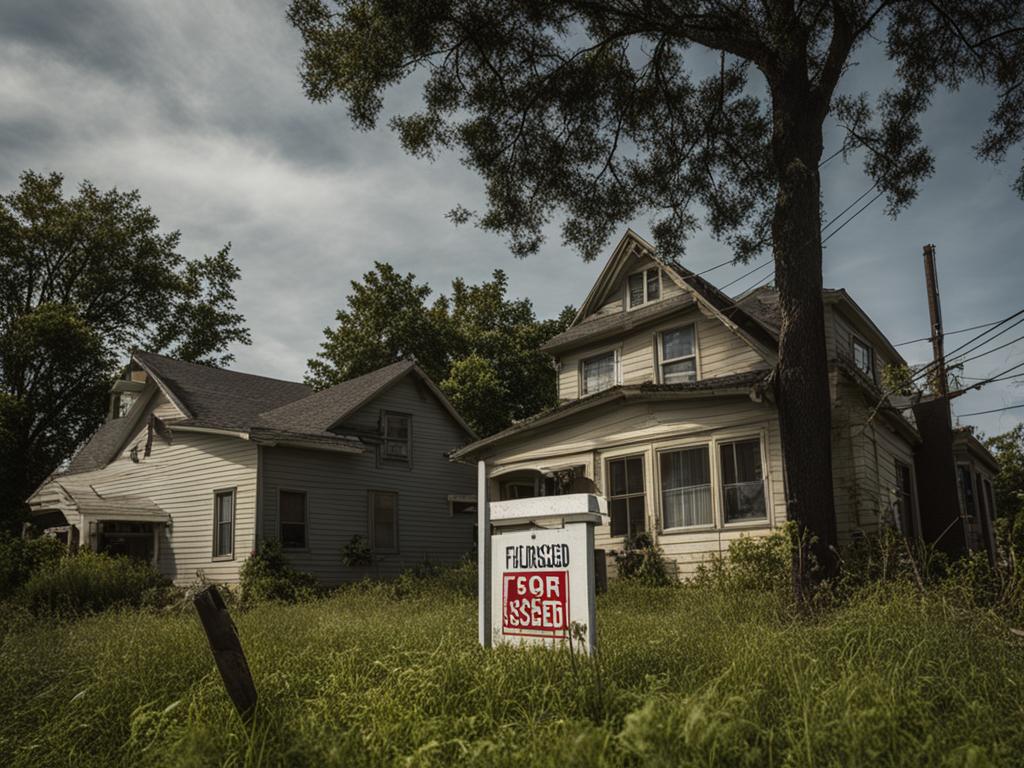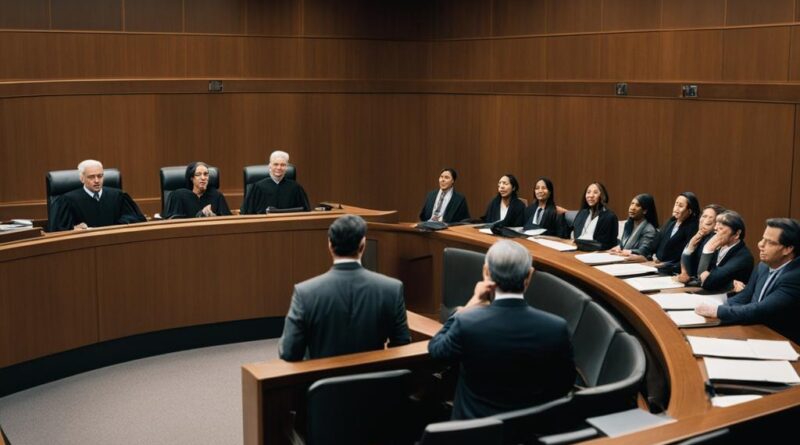Real Estate Litigation: Navigate Property Disputes
Real estate disputes can arise in various forms, creating challenges for property buyers and sellers. From chain of title issues to contract disputes and eminent domain cases, these conflicts can disrupt transactions and lead to financial and legal consequences. To successfully navigate these complexities, individuals involved in real estate disputes should consider seeking legal representation from a real estate litigation attorney.
Key Takeaways:
- Real estate litigation involves resolving disputes related to property transactions.
- Common types of real estate disputes include chain of title issues, contract disputes, and eminent domain cases.
- Hiring a real estate litigation attorney can provide legal representation and guidance for navigating property disputes.
- Seeking assistance from legal professionals can protect the interests of both buyers and sellers.
- Understanding the legal aspects of real estate disputes is crucial for a successful resolution.
Common Real Estate Disputes
In the realm of real estate transactions, disputes can arise from various legal issues. Understanding the common disputes that can occur is crucial to safeguarding your interests. In this section, we will explore some of the most prevalent real estate disputes and the importance of seeking assistance from reputable real estate law firms.
Boundary and Easement Disagreements
Boundary and easement disputes are quite common in real estate. These disputes arise when there are disagreements regarding property boundaries or conflicting rights to use someone else’s property. It is essential to remember that accurate property descriptions, surveys, and legal agreements play a significant role in resolving these disputes. Parties involved in boundary and easement disagreements can also opt for mediation or arbitration to achieve a fair resolution without resorting to lengthy litigation.
Contractual Issues
Contractual disputes often occur in real estate transactions and can arise due to various reasons. Breach of contract, misinterpretation of terms, or non-disclosure of defects are some common aspects that lead to contractual disputes. Timely resolution of these issues requires a thorough review of the contract and gathering evidence supporting each party’s claims. In many cases, mediation or negotiation can help parties find common ground and reach a mutually beneficial resolution promptly.
Landlord-Tenant Conflicts
Landlord-tenant disputes can be contentious and may arise from disagreements over rent, lease violations, or property maintenance. It is essential for both landlords and tenants to understand their rights and responsibilities as outlined in the lease agreement. Mediation or alternative dispute resolution methods can be valuable means of finding common ground and avoiding protracted litigation, ultimately preserving the business relationship between landlords and tenants.
Title Defects and Quiet Title Actions
Title defects can significantly impact property ownership and its marketability. These defects can arise from errors in the title records or competing claims to the property’s title. To resolve title defects, a thorough examination of relevant documents, such as deeds, surveys, titles, and plats, is necessary. Engaging the services of an experienced real estate attorney can help establish undisputed ownership through quiet title actions.
Construction Disputes
Construction disputes may occur between property owners and contractors, subcontractors, or architects. Issues such as delays, cost overruns, or incomplete work can lead to conflicts. Resolving construction disputes requires a detailed analysis of the construction contract, inspection reports, and proof of performance. Resorting to mediation or alternative dispute resolution methods can often provide a swift and cost-effective resolution while maintaining a working relationship between parties involved.
Nuisance and Trespass Disputes
Nuisance disputes involve the interference of a property owner’s activities with a neighbor’s right to enjoy their property, while trespass disputes arise from unlawful entry or use of another person’s property. Gathering evidence, documenting instances of nuisance or trespass, and seeking an injunction against the offending activities are essential steps to resolve these disputes effectively.
Foreclosure Disputes
Foreclosure disputes commonly arise when homeowners face financial distress, leading to mortgage defaults. Lenders seek repossession of the property through foreclosure, but homeowners can challenge these proceedings based on lender errors or violations. Consulting a real estate attorney can help homeowners explore legal options, such as loan modifications or bankruptcy, to prevent foreclosure and protect their rights.
By understanding these common real estate disputes and seeking professional advice from reputable real estate law firms, individuals can navigate through the complexities of real estate litigation with confidence.
Landowner vs. Landowner Disputes
In the world of real estate, disputes between landowners can arise due to various reasons, such as inaccurate deed descriptions, boundary conflicts, or unrecorded deeds. These disputes can be complex and require careful attention to resolve.
One of the main contributing factors to landowner disputes is inaccurate deed descriptions. When the descriptions of property boundaries are not precise or contain errors, it can lead to disagreements and conflicts between neighboring landowners.
Another common issue is boundary disputes, where neighboring landowners have conflicting opinions or interpretations of their property boundaries. These disputes often require a thorough examination of surveys, appraisals, and other relevant documentation to determine the accurate boundary lines.
Unrecorded deeds can also lead to disputes between landowners. When a deed is not properly recorded in the public records, it can create confusion and uncertainty regarding ownership rights and interests. Landowners must ensure that all deeds are recorded to avoid any future conflicts.
To address landowner disputes effectively, it is crucial to thoroughly review and analyze the property’s documentation, such as surveys, appraisals, and title searches. This process helps identify any inaccuracies or discrepancies that may be the root cause of the dispute.
In cases where the landowner dispute is complex or cannot be resolved through negotiation, it may be necessary to seek legal assistance from a real estate litigation attorney. These professionals have the expertise and experience to navigate the intricacies of landowner disputes and can provide valuable guidance and representation throughout the resolution process.
Key Points:
- Landowner disputes can occur due to inaccurate deed descriptions, boundary conflicts, or unrecorded deeds.
- Thorough review of surveys, appraisals, and title searches is essential to identify and address the issues.
- In complex cases, hiring a real estate litigation attorney may be necessary to navigate the dispute resolution process.
Pros and Cons of Landowner vs. Landowner Disputes
| Pros | Cons |
|---|---|
| Opportunity to clarify and establish accurate boundaries | Financial and emotional burden of litigation |
| Possibility of resolving the dispute through negotiation or mediation | Potential strain on neighborly relationships |
| Legal protection of property rights and interests | Lengthy resolution process |
| Potential monetary compensation for damages | Uncertainty and unpredictability of court outcomes |

Landowner vs. Government Disputes
When it comes to landownership, conflicts between landowners and the government can arise. These disputes often revolve around the exercise of eminent domain, compensation for affected land, and the concept of inverse condemnation.
The government holds the power of eminent domain, enabling them to take private property for public use. However, in doing so, they must provide just compensation to the affected landowner. Despite this requirement, disputes sometimes occur when landowners believe that the compensation they receive is unfair or inadequate.
Inverse condemnation is another area of contention in landowner-govment disputes. It refers to situations where the government’s actions, such as construction projects or changes in land use regulations, result in negative consequences for the landowner. In these cases, the landowner may seek compensation from the government for the loss in value or the inability to fully utilize their property.
Understanding the legal dimensions of these disputes is crucial for both landowners and the government. Landowners must be aware of their rights and the potential remedies available to them, while the government must carefully consider the impact of its actions on private property owners.
Let’s delve deeper into the key concepts related to landowner vs. government disputes:
- Eminent Domain: The government’s power to take private property for public use, provided just compensation is given to the affected landowner.
- Inverse Condemnation: Landowner seeking compensation from the government when their property is adversely affected by government actions.
In the case of eminent domain and inverse condemnation, it is advisable for landowners to consult with a real estate litigation attorney who specializes in property disputes. These legal professionals possess the expertise to navigate the complexities of real estate law and protect the landowner’s rights throughout the litigation process.
Resolving Property Disputes
When faced with a property dispute, it is crucial to take proactive steps in resolving the issue. Collecting proper documentation and exploring negotiation options can often lead to a satisfactory resolution. If these methods fail, taking further legal action by sending a demand letter or filing a complaint may be necessary. Seeking guidance from a real estate litigation attorney can provide invaluable support and expertise throughout the process.
One of the first steps in resolving a property dispute is to ensure that you have collected all the necessary documentation. This includes surveys, appraisals, and title searches. These documents play a crucial role in understanding the property’s boundaries, ownership interests, and potential legal issues.
After collecting the documentation, negotiation is a cost-effective approach to resolving the dispute. It involves engaging in constructive discussions with the other party to find a mutually agreeable solution. Negotiation allows both parties to express their concerns and explore potential compromises.
However, if negotiation fails to produce a satisfactory outcome, there are further actions that can be taken. One option is to send a demand letter to the other party, outlining the specific grievances and proposed resolutions. This formal document often prompts the other party to reconsider their position and opens the door to further negotiation.
If negotiations and the demand letter do not lead to a resolution, filing a legal complaint may be necessary. This involves initiating a lawsuit to address the property dispute in court. Filing a complaint formally presents the issue to the judicial system, and the process moves forward to litigation.

Throughout the process of resolving a property dispute, it is essential to seek the expertise of a real estate litigation attorney. A legal professional specializing in real estate disputes can provide guidance on the best course of action and ensure that your rights and interests are protected.
In conclusion, property disputes require careful attention and action. Collecting proper documentation, exploring negotiation options, and, if necessary, sending a demand letter or filing a legal complaint are essential steps in resolving property disputes. By seeking the guidance of a real estate litigation attorney, individuals can navigate the complexities of the process and work towards a satisfactory resolution.
Boundary and Easement Disputes
Boundary and easement disputes can be sources of conflict when it comes to property ownership. These disputes may arise due to unclear property descriptions or conflicting rights to use someone else’s property. To resolve these disputes, it is essential to consult property documents, surveys, and agreements.
One effective method for reaching a fair resolution without resorting to litigation is through mediation or arbitration. These alternative dispute resolution methods allow parties to sit down with a neutral mediator or arbitrator to work towards a mutually beneficial outcome.
Mediation provides a structured and confidential environment for parties to discuss their concerns, explore possible solutions, and ultimately reach an agreement. It allows for open communication and creative problem-solving, helping both parties maintain control over the outcome.
By choosing mediation, property owners can avoid the potential costs, time delays, and uncertainties associated with going to court. It offers a more efficient and cost-effective alternative, allowing parties to reach a resolution that suits their individual needs and priorities.
Contractual Disputes
In real estate transactions, contractual disputes are not uncommon and can arise due to various issues such as breach of contract, misinterpretation of terms, or non-disclosure of defects. Resolving these disputes requires a thorough review of the contract and evidence supporting each party’s claims.
When faced with a contractual dispute, it is essential to seek a fair and efficient resolution. Litigation can be time-consuming and costly, making alternative dispute resolution methods like mediation or negotiation highly recommended.
Mediation, in particular, allows parties to come together with the assistance of a neutral third party to explore potential solutions and reach a mutually acceptable agreement. This collaborative approach can help maintain relationships and avoid the adversarial nature of litigation.
Contractual disputes can be complex, and finding a resolution that satisfies both parties is crucial. Mediation provides an opportunity for open dialogue and compromise, allowing the parties involved to preserve their interests while avoiding the expense and uncertainty of going to court.
In the mediation process, a mediator facilitates the discussion, guides negotiations, and encourages constructive communication. By focusing on the underlying interests and concerns of each party, mediation has the potential to yield creative solutions that might not be possible through litigation.
During mediation, the parties retain control over the outcome and have the opportunity to craft a mutually beneficial agreement. This flexibility can lead to tailored solutions that consider the unique circumstances of the contractual dispute, fostering a sense of satisfaction for both parties.
| Benefits of Mediation in Contractual Disputes |
|---|
| 1. Faster resolution compared to litigation |
| 2. Cost-effective alternative to court proceedings |
| 3. Confidential and private process |
| 4. Preservation of business relationships |
| 5. Control over the outcome |
By opting for mediation in contractual disputes, parties can work towards a resolution that saves time, money, and relationships. Consulting with a qualified real estate litigation attorney can provide guidance and support throughout the mediation process, ensuring that your interests are protected.

Landlord-Tenant Disputes
When renting a property, disputes between landlords and tenants can sometimes occur. These disputes can arise from various issues, such as rent disputes, lease violations, or disagreements regarding property maintenance. It is essential for both the landlord and tenant to have a clear understanding of their rights and responsibilities as outlined in the lease agreement.
Resolving landlord-tenant disputes can be a challenging and time-consuming process. However, there are alternative methods to resolve these issues without resorting to prolonged and costly legal battles. Mediation, for example, can be an effective way for both parties to find common ground and reach a mutually satisfactory resolution.
Rent Disputes
One common issue in landlord-tenant disputes is rent disputes. These disputes can arise when there are disagreements over the amount of rent owed, the timing of rent payments, or other related payment issues. To address this, it is important for both parties to carefully review the lease agreement and any applicable state or local laws regarding rent payments and increases.
When faced with a rent dispute, tenants should gather evidence such as bank statements or canceled checks to support their claim. Landlords, on the other hand, should ensure they have clear documentation of the rent amount, due dates, and any agreed-upon late fees or penalties.
Lease Violations
Lease violations can occur when either the landlord or tenant fails to comply with the terms and conditions outlined in the lease agreement. Common lease violations include unauthorized pet ownership, subletting without permission, excessive noise, property damage, and failure to maintain the premises.
It is important for both landlords and tenants to carefully review and understand the lease agreement to prevent any misunderstanding or potential violations. By clearly outlining expectations and responsibilities, both parties can minimize the risk of disputes arising from lease violations.
Mediation and Alternative Dispute Resolution
In cases where informal negotiations between the landlord and tenant fail to resolve the dispute, mediation or alternative dispute resolution methods can provide a constructive way forward. Mediation involves a neutral third party who facilitates communication and helps the parties reach a mutually acceptable resolution.
In mediation, both the landlord and tenant have the opportunity to express their concerns, discuss possible solutions, and work towards a compromise that suits both parties’ needs. Mediation can be a more cost-effective and time-efficient alternative to litigation, allowing landlords and tenants to resolve their disputes amicably and preserve their relationship.

By understanding their rights and responsibilities and being open to alternative dispute resolution methods such as mediation, landlords and tenants can effectively resolve their disputes in a timely and efficient manner, avoiding unnecessary legal battles.
Title Defects and Quiet Title Actions
Title defects can have significant implications for property ownership and its marketability. When a property’s title is flawed or contested, resolving these issues becomes crucial to establish undisputed ownership. This is where quiet title actions come into play. Quiet title actions are legal proceedings designed to resolve competing claims and clear any clouds on the title.
In order to address title defects effectively, a comprehensive examination of relevant documents is required. This includes reviewing deeds, surveys, titles, plats, and legal agreements associated with the property. A meticulous analysis of these records allows parties involved to gather evidence and support their claims.
While it is possible to navigate the quiet title action process independently, engaging the expertise of an experienced real estate attorney is highly recommended. A skilled attorney can assist in conducting a thorough title search, identifying any defects or encumbrances, and guiding clients through the necessary legal steps to establish clear ownership.
An essential aspect of quiet title actions is the presentation of evidence that substantiates the claim to the property. This evidence may include historical records, documentation of past ownership, or any agreements and transactions related to the property. A real estate attorney can help clients gather and organize this evidence to build a strong case.
Once all necessary documents and evidence are gathered, a quiet title action can be filed with the appropriate court. This initiates the legal process to resolve the competing claims and ultimately obtain a final judgment declaring the rightful owner of the property.
By engaging a reliable real estate attorney and pursuing a quiet title action, individuals can effectively address title defects, establish undisputed ownership, and ensure the marketability of their property.

Key Steps in Quiet Title Actions
| Steps | Description |
|---|---|
| 1 | Conduct a thorough title search to identify any defects or encumbrances |
| 2 | Gather relevant documents and evidence to support the claim of clear ownership |
| 3 | Engage a real estate attorney to guide you through the process and represent your interests |
| 4 | File a quiet title action with the appropriate court |
| 5 | Present evidence and documentation to substantiate the claim and establish clear ownership |
| 6 | Proceed through the legal process, including potential negotiations and court hearings |
| 7 | Obtain a final judgment declaring the rightful owner of the property |
Construction Disputes
Construction disputes can arise between property owners and contractors, subcontractors, or architects, leading to various issues such as delays, defects, and incomplete work. Resolving these disputes requires a meticulous examination of the construction contract, inspection reports, and proof of performance. Mediation and alternative dispute resolution methods offer effective ways for parties to reach an agreement while avoiding the time and expense of lengthy litigation.
When construction disputes occur, it is crucial to understand the underlying causes and gather all relevant documentation to support your position. The construction contract serves as the foundation for resolving disputes, outlining the agreed-upon terms, project scope, and performance expectations. A careful review of inspection reports can help identify any deviations from the agreed-upon specifications, allowing both parties to assess the extent of the alleged defects or deficiencies.
In addition to contractual analysis, gathering evidence of performance is vital in construction disputes. This may include documenting timeframes, progress reports, change orders, and communications with the involved parties. By presenting a robust case backed by evidence, you can better negotiate or engage in mediation to reach a fair resolution.
Mediation proves particularly useful in construction disputes, as it allows all parties to actively participate in the resolution process. A neutral mediator facilitates open communication and aids in finding a mutually agreeable solution. Through mediation, property owners and construction professionals can avoid the adversarial nature of litigation and preserve working relationships.
Here is an example of how a construction dispute resolution table could be structured:
| Construction Dispute | Resolution Options |
|---|---|
| Delays in project completion |
|
| Cost overruns |
|
| Defective workmanship or materials |
|
| Disagreements over change orders |
|
By having a clear understanding of the available resolution options, parties involved in construction disputes can better navigate the complexities and intricacies of the construction process. Consulting with a knowledgeable construction attorney can provide valuable guidance and ensure that your rights and interests are protected throughout the dispute resolution process.
Nuisance and Trespass Disputes
Nuisance disputes and trespass disputes are common legal issues that arise between property owners. Nuisance disputes occur when a property owner’s activities infringe upon a neighbor’s right to enjoy their property peacefully. On the other hand, trespass disputes involve the unauthorized entry or use of another person’s property.
Resolving these disputes requires careful gathering of evidence and documentation. This evidence may include photographs, videos, or witness statements that support the claims of nuisance or trespass. By presenting compelling evidence, property owners can strengthen their case and protect their rights.
In some cases, seeking an injunction may be necessary to cease the offending activities and prevent further harm. An injunction is a court order that requires the responsible party to stop engaging in the activities causing the dispute. Obtaining an injunction can provide swift resolution and legal protection for affected property owners.
“A nuisance may be merely a right thing in the wrong place, like a pig in the parlor instead of the barnyard.”
– Justice Robert H. Jackson
Gathering Evidence for Nuisance Disputes:
In nuisance disputes, evidence plays a crucial role in establishing that the offending activities infringe upon the neighbor’s right to peaceful enjoyment of their property. Here are some key steps to gather evidence:
- Document instances of disturbance: Record dates, times, and descriptions of the activities causing the nuisance. Capture any physical evidence that supports your claim, such as noise recordings or photographs of the disruptive activities.
- Collect witness statements: Speak with neighbors who have witnessed the nuisance and ask them to provide written statements detailing their observations. These statements can add credibility to your case.
- Document property damage: If the nuisance activities have caused damage to your property, take photographs or videos that clearly depict the extent of the harm. This evidence can help quantify the impact of the nuisance.
Gathering Evidence for Trespass Disputes:
In trespass disputes, demonstrating that an unauthorized entry or use of your property has occurred is essential. Here’s how to gather evidence for trespass disputes:
- Document unauthorized entry: If you discover signs of trespassing, such as footprints, damage to fences, or broken locks, take photographs or videos as evidence.
- Install security cameras: Surveillance cameras can capture any future instances of trespassing, providing crucial evidence for your case. Ensure the cameras are strategically placed to cover vulnerable areas of your property.
- Collect witness statements: If anyone witnessed the trespass, ask them to provide detailed statements about what they saw. Witness testimony can strengthen your claim.
Gathering evidence for nuisance and trespass disputes is essential to protect your property rights. By presenting a compelling case, you can increase your chances of obtaining a favorable resolution and restoring peace to your property.

Foreclosure Disputes
Foreclosure disputes are a common occurrence when homeowners face financial distress and lenders seek repossession due to mortgage default. These disputes can be highly stressful and often leave homeowners uncertain about their legal options. However, it is important to know that homeowners have the right to challenge foreclosure proceedings and explore alternative solutions with the help of an experienced real estate attorney.
Challenging Foreclosure Proceedings
Homeowners facing foreclosure can challenge the proceedings based on lender errors or violations. Some common grounds for challenging foreclosure include:
- Improper notice: Lenders are required to provide homeowners with proper notice before initiating foreclosure proceedings. If the notice was not served correctly or was insufficient, homeowners may have a valid defense.
- Unfair lending practices: Homeowners can challenge foreclosure if they believe the lender engaged in predatory lending practices, such as providing misleading information or imposing excessive fees.
- Documentary errors: Lenders must maintain accurate and complete records of the mortgage and foreclosure process. If there are errors or missing documents, homeowners may have grounds for disputing the foreclosure.
To effectively challenge foreclosure proceedings, it is crucial to gather evidence and build a strong case. This is where the expertise of a real estate attorney becomes invaluable. An attorney can help homeowners navigate the complex legal process, analyze the relevant documents, and identify potential defenses.
Exploring Legal Options
Engaging a real estate attorney not only helps in challenging foreclosure but also in exploring legal options to avoid foreclosure altogether. Some common alternatives to foreclosure include:
- Loan modifications: Homeowners can negotiate with lenders to modify the terms of their mortgage, such as lowering the interest rate, extending the repayment period, or reducing monthly payments. A real estate attorney can assist in negotiating favorable loan modification terms.
- Bankruptcy: Filing for bankruptcy can provide temporary relief and stop foreclosure proceedings. Depending on the situation, homeowners may be able to restructure their debts and create a manageable repayment plan.
It is essential to note that the best course of action varies depending on the individual circumstances. Consulting with a real estate attorney allows homeowners to explore the available legal options and make informed decisions that align with their goals and financial situation.

By seeking legal representation, homeowners gain a deeper understanding of their rights and potential defenses. They can navigate the complexities of foreclosure disputes with confidence, increasing their chances of achieving a favorable outcome.
Reviewing Relevant Documents
Resolving property disputes often requires a thorough review of relevant documents, including deeds, surveys, titles, plats, and legal agreements. These records provide crucial information regarding property boundaries, ownership interests, easements, and more. Gathering and evaluating these documents can strengthen your case and provide a comprehensive understanding of the disputed issues.
A comprehensive review of documents such as deeds can help determine the property’s ownership history and any encumbrances or restrictions. Surveys provide accurate information on property boundaries, easements, and improvements. Titles establish ownership rights and any existing liens or encumbrances on the property. Plats are detailed maps showing the layout and dimensions of a property. Legal agreements, such as lease agreements or construction contracts, help clarify rights and responsibilities.
By carefully examining these documents, you can identify any discrepancies, errors, or omissions that may have contributed to the property dispute. Document review is an essential step in understanding the facts and legal issues surrounding your case.
“The value of reviewing relevant documents cannot be overstated. It allows you to gather evidence, identify potential issues, and formulate strong arguments. It is crucial to carefully examine the details and seek expert guidance when necessary.”
During the review process, it is recommended to take detailed notes, make copies of important documents, and organize them in a logical and easily accessible manner. This ensures that you have all the necessary information at your fingertips when discussing the case with your attorney or presenting it in court.
Additionally, if you are unsure about the meaning or implications of certain provisions or legal terms, it is advisable to seek guidance from a real estate attorney who specializes in property disputes. Their expertise can help you interpret complex documents and navigate the legal complexities of your case.
Key Takeaways:
- Reviewing relevant documents, such as deeds, surveys, titles, plats, and legal agreements, is a crucial step in resolving property disputes.
- These documents provide important information about property boundaries, ownership interests, encumbrances, and restrictions.
- Thorough document review helps identify discrepancies, errors, or omissions that may have contributed to the dispute.
- It is recommended to take detailed notes, make copies of important documents, and organize them for easy reference.
- Consulting a real estate attorney specializing in property disputes can provide valuable guidance and interpretation of complex documents.

Negotiating with the Other Party
When it comes to resolving property disputes, attempting to negotiate a fair settlement with the other party is often the first step. Negotiation requires a willingness to find common ground and reach a compromise that satisfies all parties involved. By engaging in open and constructive discussions, it is possible to avoid lengthy and costly legal battles while finding a resolution that aligns with everyone’s needs.
“Negotiation is the art of reaching an agreement by finding common ground.”
However, there are situations where positions become entrenched, and negotiations may stagnate. At this point, seeking guidance from legal counsel is crucial to protect your interests effectively. A real estate litigation attorney can provide valuable advice and representation, ensuring that your rights are safeguarded throughout the negotiation process.
“Legal counsel can guide you through complex negotiations, protect your rights, and help you navigate the intricacies of the legal system.”
In some cases, negotiations may require additional support, such as mediation, to facilitate productive discussions and reach a favorable outcome. Mediation provides a neutral third party who assists in finding common ground, facilitating communication, and fostering compromise. The mediator’s role is to ensure that both parties have the opportunity to share their perspectives and explore mutually beneficial solutions.
“Mediation can be a valuable tool in the negotiation process, allowing for a more efficient and amicable resolution of property disputes.”
| Benefits of Negotiating | Benefits of Legal Counsel | Benefits of Mediation |
|---|---|---|
| 1. Cost-effective | 1. Legal expertise and guidance | 1. Neutral third-party facilitation |
| 2. Greater control over the outcome | 2. Protection of your rights and interests | 2. Encourages open communication |
| 3. Allows for creative solutions | 3. Knowledge of the legal system | 3. Preserves relationships |

Remember, negotiation is an essential part of resolving property disputes. It is an opportunity to find common ground, compromise, and avoid the emotional and financial toll of litigation. However, when negotiations become challenging or one party refuses to cooperate, consulting with a real estate litigation attorney can provide the necessary legal counsel and representation to protect your rights effectively. With the right guidance, you can navigate the negotiation process with confidence and work towards a satisfactory settlement.
Conclusion
In the complex world of real estate, disputes and conflicts can add significant stress and financial burden to property owners. However, by understanding common real estate disputes, gathering the necessary documentation, and exploring negotiation or mediation options, resolution can often be achieved in a satisfactory manner.
When negotiation fails to yield the desired outcome, filing a lawsuit may become necessary. At this critical juncture, the guidance and expertise of a real estate litigation attorney can prove invaluable. With their deep knowledge of the real estate litigation process, these professionals can navigate the complexities of the legal system on behalf of their clients, while ensuring their best interests are protected.
Through a combination of attention to detail, strategic thinking, and rigorous advocacy, a skilled real estate litigation attorney can help property owners effectively pursue their desired outcomes. From gathering evidence and crafting legal arguments to representing clients in court, these attorneys are essential allies in the pursuit of justice and resolution in real estate disputes.
FAQ
What types of disputes can arise in real estate?
Real estate disputes can take various forms, including chain of title issues, lot line problems, contract disputes, and eminent domain cases.
How can a real estate litigation attorney help in a real estate dispute?
Hiring a real estate litigation attorney can provide legal representation and guidance for buyers and sellers when faced with a real estate dispute.
What are some common real estate disputes?
Common real estate disputes include boundary and easement disagreements, contractual issues, landlord-tenant conflicts, title defects, construction disputes, nuisance and trespass disputes, and foreclosure disputes.
What can be done to resolve landowner vs. landowner disputes?
Disputes among landowners can be resolved by thoroughly reviewing property documentation, such as surveys, appraisals, and title searches, to address inaccurate deed descriptions, boundary disputes, or unrecorded deeds. Negotiation or hiring a real estate litigation attorney may be necessary for complex disputes.
What are landowner vs. government disputes?
Landowner vs. government disputes involve the government’s power to take private property for public use through eminent domain, which can lead to disputes regarding fair compensation. Inverse condemnation can occur when the landowner is negatively affected by the government’s actions.
How can property disputes be resolved?
Resolving property disputes may involve collecting necessary documentation, such as surveys, appraisals, and title searches, and considering negotiation or mediation. If an agreement cannot be reached, sending a demand letter or filing a legal complaint may be necessary. Consulting with a real estate litigation attorney can provide guidance throughout the process.
What are boundary and easement disputes?
Boundary and easement disputes arise from unclear property descriptions or conflicting rights to use someone else’s property. Resolving these disputes may require consulting property documents, surveys, and agreements. Mediation or arbitration can be effective methods to reach a fair resolution without resorting to litigation.
What are common contractual disputes in real estate?
Contractual disputes in real estate often involve issues such as breach of contract, misinterpretation of terms, or non-disclosure of defects. Resolving these disputes requires a thorough review of the contract and evidence supporting each party’s claims. Mediation or negotiation can help parties reach a mutually beneficial resolution without the need for costly litigation.
What are some common landlord-tenant disputes?
Landlord-tenant disputes can arise from various issues, including rent disputes, lease violations, or property maintenance disagreements. Understanding the rights and responsibilities outlined in the lease agreement is crucial for both parties. Mediation or alternative dispute resolution methods can help landlords and tenants find common ground and avoid prolonged legal battles.
How are title defects and quiet title actions resolved?
Title defects can impact property ownership and marketability. Quiet title actions are legal proceedings aimed at resolving competing claims to a property’s title. Successfully addressing title defects requires a comprehensive examination of relevant documents and engaging an experienced real estate attorney to establish undisputed ownership.
What are common issues in construction disputes?
Construction disputes can occur between property owners and contractors, subcontractors, or architects and may involve issues such as delays, cost overruns, or incomplete work. Resolving these disputes often requires a detailed analysis of the construction contract, inspection reports, and proof of performance. Mediation or alternative dispute resolution methods can help parties reach an agreement while avoiding lengthy litigation.
What are nuisance and trespass disputes?
Nuisance disputes arise when a property owner’s activities interfere with a neighbor’s right to enjoy their property, while trespass disputes involve unlawful entry or use of another person’s property. Resolving these disputes may involve gathering evidence, documenting instances of nuisance or trespass, and seeking an injunction to stop offending activities.
What legal options do homeowners have in foreclosure disputes?
Foreclosure disputes typically involve homeowners facing financial distress and lenders seeking repossession due to mortgage default. Homeowners can challenge foreclosure proceedings based on lender errors or violations. Engaging an experienced real estate attorney can help explore legal options, such as loan modifications or bankruptcy, to prevent foreclosure.
What documents are important in resolving property disputes?
Resolving property disputes often requires a thorough review of relevant documents, including deeds, surveys, titles, plats, and legal agreements. These records provide crucial information regarding property boundaries, ownership interests, easements, and more.
What is the first step in resolving property disputes?
Attempting to negotiate a fair settlement with the other party is often the first step in resolving property disputes. Successful negotiation requires a willingness to find compromise. However, when positions become entrenched or negotiations stagnate, seeking guidance from legal counsel may be necessary to protect your interests effectively.
How can real estate litigation attorneys assist in the litigation process?
Real estate litigation can be complex and emotionally and financially draining. Understanding common real estate disputes, gathering necessary documentation, and considering negotiation or mediation can often lead to a satisfactory resolution. However, when negotiation fails, filing a lawsuit may be necessary, and the guidance of a real estate litigation attorney can be invaluable throughout the litigation process.

